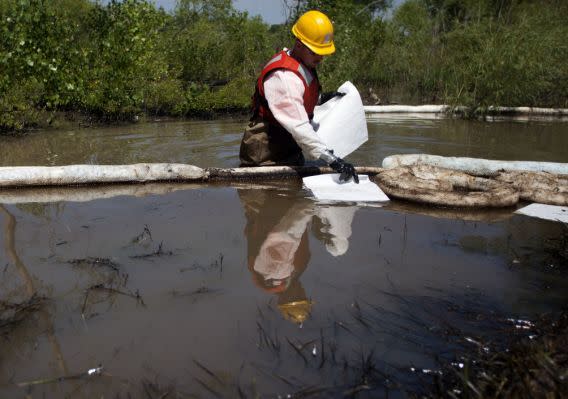 Daily Brew
Daily BrewThe court that goes after warlords sets sight on the environment, and Canada should be concerned

[A worker cleans up after an oil spill in the Yellowstone River in Laurel, Mont. AP Photo/Jim Urquhart]
The message is clear from the International Criminal Court — it’s training its legal eye on corporations who do harm to the environment.
“There’s nowhere to hide now. Environmental conduct is human rights conduct,” warns Lynda Collins, an expert on environmental human rights at the University of Ottawa.
Collins is referring to the International Criminal Court’s pronouncement it would now examine crimes committed in light of “the destruction of the environment, the illegal exploitation of natural resources, or the illegal dispossession of land.”
That policy change, announced in September, has caused a massive ripple through Collins’ world. It has put heads of companies — from mining to oil to any resource extraction — on guard.
“The ICC is normally associated with prosecuting warlords but now it recognizes that environmental harm can and does violate human rights,” Collins told Yahoo Canada News.
Collins knows her stuff, she has published on a wide set of issues on the topic such as environmental rights under the Canadian Charter of Rights and Freedoms and Aboriginal environmental rights. She is also a professor with the Centre for Environmental Law & Global Sustainability at the U of O.
“What they are looking at is examining environmental dimensions under the Rome Statute [which governs the ICC]. So they are not adding a new policy but simply interpreting a crime such as mass killing in an ecological manner,” she said.
“Let’s say a community is essentially being killed through their water supply because of contamination by a company’s plant or mill — that could be a mass killing or genocide.”
The official definition of genocide, according to the statute governing the ICC, concerns acts committed “with intent to destroy, in whole or in part, a national, ethnical, racial or religious group.”
In the case of Canadian mining companies that operate in many countries abroad, Collins said there are two ways the ICC might investigate: one, they are causing pollution that is affecting the health of locals; or, the companies will often hire a security company to manage their site.
Sometimes, these operatives are accused of assaulting or killing locals. In these cases, it is more likely that the security personnel could be brought before the ICC.
“For a CEO to be charged by the ICC, we would need clear evidence that person directed his people to do the actual deed, whether harming people directly or, say, dumping toxins into the water source. In most cases, CEOs are rarely that close to day-to-day operations.”

[The International Criminal Court in The Hague, Netherlands. Reuters/Jerry Lampen]
Legal consequences in Canada
In immediate terms, it’s unlikely any CEO or major heads of corporations will be taken before the ICC any time soon, but there are real implications within Canada.
“Right now, there’s the case of Grassy Narrows, which is under litigation in Ontario Superior Court,” Collins said.
New research shows that 90 per cent of the population at Grassy Narrows and Wabaseemoong First Nations still suffers the effects from mercury dumped 40 years ago in the river that flows through the two northwestern Ontario communities by Reed Paper, upstream in Dryden, Ont.
“Under the ICC’s statutes, forcible relocation can be viewed as a crime against humanity. And if you are polluting people’s land and they can’t live there anymore, you are, arguably, forcing them to move,” Collins said.
According to Collins, Canadian courts often look to international sources for interpretations of the Charter when they feel they need clarification.
“Canadian courts have done this before, taken into account concepts laid out by a supra-national entity like the ICC,” she said.
And also, there is a major decision coming up at the Supreme Court of Canada, she said, with a Charter Charter environmental claim before the justices for the first time.
It concerns the 6,300-bed Jumbo Glacier ski resort development in the East Kootenay region of B.C.
“This is a new kind of argument. An Indigenous community is saying that the building of the resort on a sacred mountain is violating their [Freedom of Religion] under Section 2a of the Charter.”
The case concerning the Ktunaxa First Nation will be before the Supreme Court on Dec. 3.
“Ultimately, what the ICC is saying, [and it’s directed towards companies], is you are now operating under the supervision of the International Criminal Court and we will be watching.”


